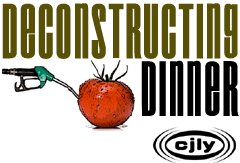
The patenting of our food supply through biotechnology could be suggested as one of the greatest systems of control ever devised. As the executive branches of North American governments alongside corporate interests push the Security and Prosperity Partnership (SPP) forward, it should be noted that reference to "biotechnology" is littered throughout SPP literature.
While the NDP has taken on the legitimacy of the SPP as a major campaign, it became clear following last week's broadcast that the ability to politically challenge this system of food control in Ottawa is running into obstacles.
There are, however, community-led alternatives: GE-Free Zones. Last week's broadcast concluded with a sampling of audio clips from the first GE-Free Kootenays meeting taking place in Nelson, B.C., in November 2007.
Local residents and politicians gathered together to discuss the creation of such a zone. This broadcast continues in more depth by exploring the dialogue that took place during that meeting. The show seeks to create a better understanding of how all communities can begin taking such concerns into their own hands. We also spend time learning of similar efforts being forged in one of the last areas of North America still free of genetically engineered crops: The Yukon.
Guests
Tom Rudge -- GE-Free Yukon (Whitehorse, YK) -- Tom is a steering committee member of the Society for a GE Free BC. He is a drector of the Canadian Biotechnology Action Network (CBAN), founding member of the Fireweed Community Market, the leader of the Whitehorse Slow Food Convivium. Tom has been around since the beginning of the organic food movement in the Yukon, and is part of Growers of Organic Food Yukon -- a chapter of the Canadian Organic Growers. He has a degree in agriculture, and operates a certified organic farm, Aurora Mountain Farm.
Jessica Stevenson -- researcher, Greenpeace Canada (Vancouver, BC) -- Greenpeace Canada has been running an ongoing campaign titled "Say No to Genetic Engineering." The organization has commissioned a number of polls, among them one that indicated British Columbians overwhelmingly demand labelling of foods that contain genetically-engineered ingredients. Greenpeace opposes the release of GE crops and animals into the environment based on the precautionary principle. They advocate interim measures including the labelling of GE foods and the segregation of GE crops and seeds from conventional and organic seeds. Greenpeace supports the 58 recommendations made in 2001 by the expert panel of the Royal Society of Canada. They also oppose all patents on plants, animals, humans and genes.
Voices
Angela Reid -- deputy leader, Green Party of British Columbia (Kelowna, BC) -- Angela has run as a Green Party candidate in four elections, two provincial and two federal, between 2001 and 2006. In the spring of 2006, Angela was appointed to the Federal Council of the Green Party of Canada (GPC), and soon after was elected as a councillor at large during the GPC's August Convention in Ottawa. Angela is also the CEO of the GPC's Kelowna Electoral District Association, and was recently appointed the Okanagan Regional Representative for the Green Party of British Columbia. She operates Tigress Ventures providing consulting services for environmental and socially-oriented businesses.
Gord McAdams -- councillor, City of Nelson (Nelson, BC) -- Gord has worked as an ecologist for B.C.'s Ministry of Water, Air and Land Protection. In 2005, he was fired for bringing confidential government documents to the B.C. Supreme Court in support of a court action brought by the West Kootenay Ecosociety. The documents showed that the minister of Water, Land and Air Protection had made "an unauthorized exercise of his statutory power" when he favoured a developer by agreeing to move an access road in Grohman Narrows Provincial Park. The government documents clearly stated that the new road would bury nests and kill eggs of endangered painted turtles in the park. On Dec. 11, the Campaign for Open Government and the B.C. Freedom of Information and Privacy Association presented Gord with the Whistleblower Award for 2007.
Related Tyee stories:
- All Tyee podcasts
- The 100-Mile Diet Series
- The Evolution of Frankenfoods?
The multibillion-dollar nanotech industry wants to change what you eat at the molecular level.
Read more: Deconstructing Dinner














Tyee Commenting Guidelines
Comments that violate guidelines risk being deleted, and violations may result in a temporary or permanent user ban. Maintain the spirit of good conversation to stay in the discussion.
*Please note The Tyee is not a forum for spreading misinformation about COVID-19, denying its existence or minimizing its risk to public health.
Do:
Do not: